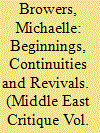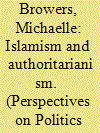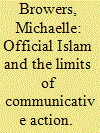|
|
|
Sort Order |
|
|
|
Items / Page
|
|
|
|
|
|
|
| Srl | Item |
| 1 |
ID:
178139


|
|
|
|
|
| Summary/Abstract |
This article examines some of the first translations of Gramsci into Arabic by young, New Left figures associated with a short-lived group called “Socialist Lebanon.” Thinking à la Edward Said about the undertaking of translations of ideas from one context to another and one language to another as a potentially productive act of beginning, I argue that these first translations, undertaken as part of a revolutionary praxis of young, militant intellectuals, not only reveal some of the limitations and possibilities in the development of a Gramscian analysis of Lebanese politics. Rather, their efforts were central to the formation of a New Arab Left and the strands of those beginnings not only are detected in the later work of several of these activist-translators, even after they had moved beyond militant politics, but also remain visible in later revolutionary praxis in the region. By foregrounding the way in which each subsequent “Gramsci boom” (in the 1990s and after 2010) exists in relationship to an ongoing revolutionary praxis that reads and translates the Arab Left anew, I also seek to provide evidence of what Michele Filippini refers to in this issue as an “Arab provincialization” of Gramscian thought and what I prefer to highlight as a continuous tradition of Arab Left revolutionary praxis.
|
|
|
|
|
|
|
|
|
|
|
|
|
|
|
|
| 2 |
ID:
050250


|
|
|
|
|
| Publication |
Lanham, Lexington Books, 2004.
|
| Description |
ix, 209p.
|
| Standard Number |
9780739105542
|
|
|
|
|
|
|
|
|
|
|
|
Copies: C:1/I:0,R:0,Q:0
Circulation
| Accession# | Call# | Current Location | Status | Policy | Location |
| 047607 | 297.09051/BRO 047607 | Main | On Shelf | General | |
|
|
|
|
| 3 |
ID:
132979


|
|
|
|
|
| Publication |
2014.
|
| Summary/Abstract |
Based on the texts of the five works under review here and what we know about the pace of academic publishing, it is clear that the bulk of the analysis provided in each was written prior to the waves of demonstrations and protests that swept the Arab region beginning in December 2010. One can only imagine how many scholars of Arab politics with books in process were faced with the dilemma of whether a chance to revisit the text was worth delaying publication or mourning the passing of the opportunity to make that decision. The authors of three of the works under review were able to incorporate some analysis of events that were only unfolding as the texts went to press, in prefaces, introductions, conclusions, and codas. The two authors who did not have or take the opportunity to reference the uprisings are no poorer as a result. For the most part, each of these books contributes something important to our understanding of the recent political upheavals and changes that continue to unfold.
|
|
|
|
|
|
|
|
|
|
|
|
|
|
|
|
| 4 |
ID:
106658


|
|
|
|
|
| Publication |
2011.
|
| Summary/Abstract |
After 11 September 2001 many analysts, declaring a 'crisis of authority' in Islam, bemoaned the dearth or absence of Islamic moderates who could rise up and lead the way beyond what many worried was an impending 'clash of civilisations'. The 2004 'Amman Message'-which seeks to clarify who and what does and does not constitute 'true Islam'-was put forth precisely as a response to that challenge. At the same time critical examination of the construction of this declaration, and of the uses to which it has been put, reveals that, as much as this document may seem to provide an example of communicative action, in practice it has all too often served strategic actions. I argue that the embeddedness of the Message in domestic, regional and international political interests undermines the document's authority as the basis for dialogue or action aimed at civility and mutual understanding.
|
|
|
|
|
|
|
|
|
|
|
|
|
|
|
|
|
|
|
|
|